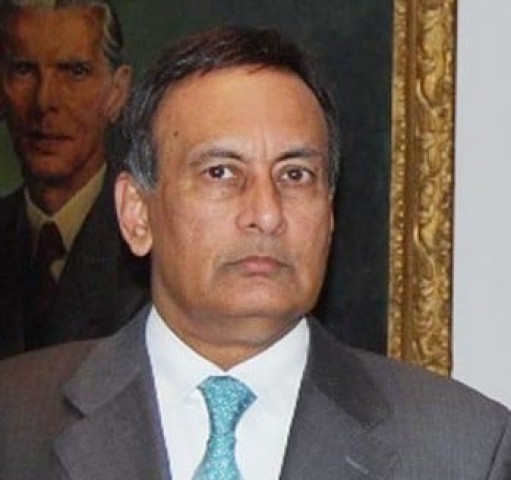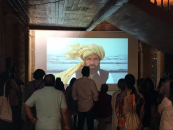Magnificent Delusions: Bilateral misdemeanours
Haqqani narrates ‘parallel realities’ of lost opportunities, parochial priorities and diverging interests in his book.

Former ambassador to US Husain Haqqani. PHOTO: PID/ FILE
Two years ago, former president Asif Ali Zardari was brought a letter by US President Barack Obama that spelled out a ‘grand bargain’. The US had offered a long-term strategic partnership if Pakistan cooperated in defeating all militant groups that threatened the region’s and American security.
But Islamabad was not ready, writes Husain Haqqani in his new book titled Magnificent Delusions: Pakistan, the United States, and an Epic History of Misunderstanding, to be released today (Tuesday). Zardari’s reply repeated old clichés about Afghanistan and the Indian threat, according to the author. National Security Adviser James Jones had received a 50-page thesis on Pakistan’s strategic interests, Haqqani recalls, which he had read while he was the country’s ambassador to the US.
He believes Pakistan had ‘missed the opening for defining its partnership with the world’s sole superpower on more favourable terms than ever before’.
Haqqani partakes in describing Pakistan-US relations through nuanced analyses in some chapters and storytelling in others. He narrates ‘parallel realities’ of lost opportunities, parochial priorities and diverging interests in the 350-page book.
The first chapter begins with the evocative description of Muhammad Ali Jinnah, the Quaid-e-Azam, being interviewed by Life magazine at his Flagstaff House residence. It was remarkable to read what Jinnah had to say about relations with the United States then, as it was the exact narrative of the bilateral ties prevalent in the country today.
“America needs Pakistan more than Pakistan needs America,” the founder said to the reporter who took his interview. “Pakistan is the pivot of the world.”
This ‘narrative’ has shaped Pakistan-US relations for the last 65 years, which is encapsulated in Magnificent Delusions.
When one starts reading the book, it seems as if Haqqani is blaming Pakistan’s military-security establishment for the sour and duplicitous relations. “We sought US aid in return for promises we did not keep,” he writes.
However, as one turns pages, he blames the United States as well in investing in the wrong people at the wrong time. During 2011, when the relations between the countries were at an all-time low and Haqqani was ambassador, he describes, “... 90 per cent of Pakistan’s relations with the United States were government related. Business, investment, travel, tourism, education, and everything else represented only 10 per cent of ties.” But US Special Representative for Afghanistan and Pakistan Marc Grossman acknowledged that “healthy bilateral relations were usually 60 per cent private and 40 per cent government”. This shows how the United States didn’t uphold its own principles of maintaining relations.
The book also contains enthralling first-hand details of closed-door meetings among the top echelons of the civilian and military institutions of the two countries.
Haqqani describes the irony of the ‘friendship’ in the concluding chapters. He talks of “parallel narratives that shaped US-Pakistani relations” and how both believe they have leverage over another, which can be milked for short-term goals.
“Just because they don’t get along does not mean they must be antagonists, however; they should just lower their expectations of one another, inject a cautious wariness in their future plans, and recognise that their electorates are fatigued by the other,” he concludes.

Excerpts from the book
In an attempt at humor I sent a copy of Samuel Huntington’s book The Soldier and the State: The Theory and Politics of Civil-Military Relations to Kayani along with a four-page summary. The book deals with the role of a professional military in a democracy. Kayani acknowledged receiving the book and appreciated the summary. But I have no reason to believe that it affected his thinking or decisions in any significant way. Kayani was personally always agreeable with civilians. The Pakistan army, as an institution, still remained a long way from accepting the right of civilians to debate, let alone define, national interest. (334)
………………………………………………………………………………………………………………………………………
He [Zia] added dramatically:
“Pakistan might not be a large or important country but it was an honorable one.” He could give his word of honor as a soldier that Pakistan would not develop, much less explode, a nuclear weapon or explosive device. While recording Zia’s response, Walters [US special envoy to Pakistan] added his own comment: “Either he really does not know [of Pakistani nuclear weapons sites],” the American general said, “or he is the most superb and patriotic liar I have ever met.(226)
Pasha and the ISI continued to propel hypernationalist sentiment. Pasha once told me that this was one of the few tools Pakistan had for leveraging itself in an asymmetric relationship. (335)
………………………………………………………………………………………………………………………………………
Pakistan’s security establishment’s unwillingness to speak openly about allowing drone operations was matched by America’s own secrecy about the entire program... The United States insisted that their strikes only targeted terrorists with precision.Meanwhile, the ISI kept quiet about some strikes, possibly the ones they approved, while encouraging protests about others that killed some of their Jihadi allies. The civilians were seldom briefed in detail about the ISI-CIA relationship and had little say in its conduct. (328)
………………………………………………………………………………………………………………………………………
The willingness of my countrymen to believe the worst about their ambassador [Haqqani himself]reflects a deeper pathology.Instead of basing international relations on facts, Pakistanis have become accustomed to seeing the world through the prism of an Islamo-nationalist ideology. Even well-traveled, erudite, and articulate Pakistani officials echo this ideology without realizing that holding tight to these self-defeating ideas makes little impact on the rest of the world; the gap is widening between how Pakistanis and the rest of the world view Pakistan. (5)
Published in The Express Tribune, November 5th, 2013.



















COMMENTS
Comments are moderated and generally will be posted if they are on-topic and not abusive.
For more information, please see our Comments FAQ